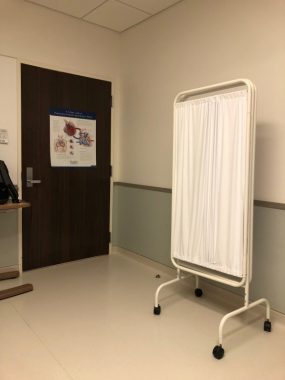Researching My Illness: Learning to Let Go and Trust My Physician
Written by |

As a research sociologist, my goal is to research anything and everything I need answers to. I often become so preoccupied with this search that it becomes an obsession.
Many people turn to online research for answers about health issues, and I am no different. When it comes to my health, I turn into a research beast. I will spend hours on the internet seeking answers to my rare illness.
Whenever I get anxious about my health, I find myself going into beast mode. I research until my eyes hurt and my fingers go numb.
It has become such a problem that my family has begun to worry. My doctors have already told me to stop causing myself anxiety, and as much as I don’t want to hear it, they are right. I am not a medical doctor, and they certainly know more about my disease than I do.
So why can’t I just let it go?
Sociological research involves studying society, culture, socialization, social structure, and so on. How can I possibly know anything about the medical world and its diagnostics?
I must learn to trust and leave medical research to the professionals who are scientifically knowledgeable.
So why can’t I just let it go?

My sociology instructor textbooks. (Photo by Ann Reynoso)
Whenever I get lab work, a CT scan, or any other procedure done, I am anxious to know the results. Once I receive them, I go into research mode.
Why can’t I just let it go?
Am I hoping for a restoration of my life before illness? Am I hoping there is some truth to “a fountain of good health”?
I have often asked myself, “What are you afraid of? Why do you keep looking for answers? Why can’t you just trust your doctors?”
I have changed doctors many times in the past two years. My excuse is always the same: They don’t fit my personality. But I’ve realized it’s not that they don’t fit my personality, it’s that I’m afraid they will.
Once a doctor fits my personality, I will finally have to stop running from the truth. I’m realizing I still carry a little anger toward this disease. I haven’t yet come to terms with it, therefore, my disease and I are having a hard time becoming friends.
This is where my new pulmonologist comes to the rescue.
I have found a new doctor at the Houston Methodist Lung Center in Texas. Our first visit felt comfortable and easy. I told her my immediate and long-term concerns, and she answered honestly, without hesitation. We talked about my career and plans for the future. I told her when I first noticed my symptoms.

The doctor’s office. (Photo by Ann Reynoso)
Then, I mentioned I have been doing my own research.
Her advice was, “There are medical journals out there that can help you to understand your rare illness, but as a sociologist, you should know that research takes time. With a rare illness, you may not easily or swiftly get the answers you want. This is where you let me take over your health, and your job is to help me by taking care of yourself.”
Myself. I’ve been so busy running away from the reality of my illness instead of accepting it. This illness can either be my enemy or a part of me I can nurture and care for. Hopefully, I’ll live longer than expected.
If you or someone you know is struggling with a rare illness, know that you’re not alone. Find the right doctor who will walk with you on this course. Trust that their priority is keeping you healthy. Trust that they will do everything possible to keep up with the latest research, tests, and medicines available.
Rare illnesses may not have answers or cures, but with the right treatment and care, we can prolong our lives.
For now, I will stick to taking care of myself physically and mentally. I will leave the medical research to the experts. It doesn’t mean I won’t peek at it now and then, but I will not allow my anxiety to take over.
I am in good hands.
***
Note: Pulmonary Fibrosis News is strictly a news and information website about the disease. It does not provide medical advice, diagnosis, or treatment. This content is not intended to be a substitute for professional medical advice, diagnosis, or treatment. Always seek the advice of your physician or other qualified health provider with any questions you may have regarding a medical condition. Never disregard professional medical advice or delay in seeking it because of something you have read on this website. The opinions expressed in this column are not those of Pulmonary Fibrosis News or its parent company, Bionews, and are intended to spark discussion about issues pertaining to pulmonary fibrosis.







Ronald Cole
Thank you for this article, I was feeling the same way.
Ann Reynoso
Thank you Ronald for reading my column. It is always nice to know that there are others who have the same issue. I have come to realize that fear of my illness was clouding my ability to see that my physicians are there to help.
Mark Selbert
Like to hear from anyone that is or was on Prednisone. I just started . 2 tablets in the morning. Total of 40 mg. Then after 5 days will be 3 pills @10 mg total 30 mg.
My pulmonologist put me on Prednisone to try and see if my coughing attacks dry heaves and phlegm stop. I hope it works.
Any advice or your side effects would be appreciated to hear.
Thanks Mark
Ann Reynoso
Hello Mark. Thank you for reading my column. In the beginning stages of getting treatment for my illness, I was placed on Prednisone. One of my complaint symptoms was the horrible cough. My cough was so bad that I could not function on a daily basis. It stopped me from eating, talking, and laughing. The coughing spells were hard on me. My doctor put me on 60 mg/daily for three months. To my surprise it did help with my cough. One of the side effects I had was feeling jittery for the first week and that went away, but what stayed was my appetite. I have to say that I did gain weight in the three months I was on Prednisone. I am not on Prednisone anymore. I now take other medications to help with my illness, such as Ofev, Cellcept, and I take Trelegy to keep my cough under control. Good Luck with your treatment.
Joe Wharton
My IPF started up about 2.5 years ago. But in 2012 i came home with COP NO D, thats my under lying condition, when i get the wheezies or congestion in my lungs i increase the prednizone up to using a pack.. Anyway i have been on prednisone nine yrs. Take 10mg daily as a maintaince, causes weight gain watch your intake especially starches and sugar. When i have to take larger doses say 20 mg my sleep time is maybe five hours instead of eight. Hope this helps.
Marilyn Cellucci
Dear Ann,
I had a similar problem as you in researching my illness. But I was a hospital pharmacist many years ago, so I seem to think that I am more qualified than most people. I have found out that I am not! You have to trust your doctor.
Good luck to you.
Marilyn Cellucci
Marilyn Cellucci
Dear Ann,
My pulmonologist had me on Breo (same as Trelegy) for a while, but I hated it. It seemed only to get on my tongue.I don't know how much actually made it to my lungs.I could still taste it in the back of my mouth even by the end of the day.
I am currently on high dose steroids and they have eliminated the very thick phlegm I had in my throat, what a relief, and my coughing isn't as bad.
Marilyn Cellucci
Ann Reynoso
Hello Marilyn. Thank you for reading my column. It is always nice to hear about everyone's personal experience. I was taking an emergency inhaler before the Trelegy, so I was pretty much used to knowing how to use it. I do agree that the taste is bad and I too, have the problem of it sticking to the back of my mouth and throat. At times, my voice goes hoarse, but it has helped with my cough. I take so many medications that it has now just become a daily routine for me. My family is so tired of hearing my phone alarm go off to remind me to take my next dose. I am so happy to hear that you found a treatment for your cough. Stay safe and healthy!
Brenda Gaier
Hello fellow rare disease friends. Covid slowed me down getting all the tests and seeing a Pulmonary doctor. I was on Breo before my diagnosis. I never had a bad continuous cough. Thank goodness. I would cough for about an hour after I laughed or talked a lot. I don't know how much Breo goes to my lungs. I take it every morning before I brush my teeth. I find that helps with the feeling of residue in my mouth. If I don't do that my mouth will get sore. I was to my Rheumatologist on Monday. He took the time to let me ask questions. I told him I read a lot about this disease and wanted to know if there's an average life expectancy. He said there's not enough studies and I might not ever find out. He did say the 3 to 5 years is about right but they are working on new things to slow the progression. I'm on 20 MG of Prednisone and an antibiotic, and oxygen, when active, now. That helps the ache in my chest. He said my endurance before becoming breathless will stay the same or decrease. I will find out how fast this is progressing in October when I take all the tests again and they compare results. Nothing very positive but it was stuff I needed to hear from a doctor.